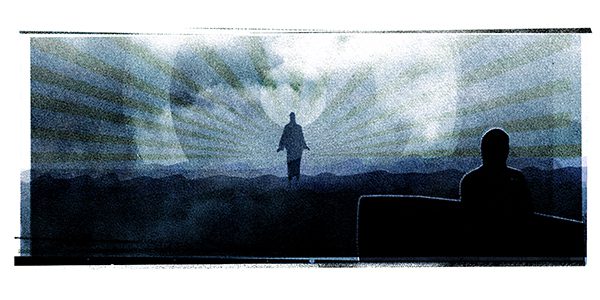
I want to tell you a story.
I want to tell you a story of a powerful, personal experience of the Holy Spirit.
I want to tell you a story of a time when the presence of God with me was tangible, undeniable, enveloping like warm water, as real as the chair you are sitting in. I want to tell you of how I trembled and was transformed.
I want to tell you a story like that, but I can’t. Because I don’t have one.
I am not a mystic. I am a Martha, a Thomas, a Peter. When my Lord comes to me, you’d better believe he’ll find me in the kitchen, complaining. Or among believers, skeptical. Or among unbelievers, scared, denying Him.
Peter, in particular, might be my soul-mate. We walked together recently, on the Feast of the Transfiguration. In that Gospel reading, Peter, James, and John are taken up a mountain—Peter, perhaps, stumbling a bit, picking stones out of his sandals, having trouble keeping up with the Sons of Thunder—where they are faced with the transformed Christ, speaking with the spirits of Abraham and Elijah. A clear and present revelation of the Divine.
What does Peter do? Does he fall down in worship? Does he allow himself to be absorbed in the timeless Truth? Does he remain still, and know that he is with his God?
Not Peter. Peter volunteers to build some tents.
What a relief it would be for Peter to head back down the mountain! He sees himself calculating the length of canvas required, measuring and cutting poles, haggling over the cost of twine. Peter and I want to serve, but only if we are safe, secure among the things we understand.
Mystery makes us itch.
This Sunday’s gospel is another story of Peter’s failure to engage with the miraculous, only this time, the miraculous has the nerve to encroach on the only remaining place where Peter feels competent: a boat.
In the fourth watch of the night, otherwise known as “that time in the very early morning when normal human beings are least capable of dealing with a crisis,” Peter and the disciples are caught in a storm. Peter, the fisherman, understands storms. Storms make sense. What does not make sense is that Jesus of Nazareth, who yesterday told them specifically to go on ahead and that he would meet them on the other side, is instead walking towards them over the roiling water, looking like a ghost, calling,
“Take courage, it is I, do not be afraid.”
Which is exactly what a scary, tricky ghost would say.
Yet after all that he’s been through, Peter wants to do better. Peter wants to test himself. He wants to set an example of faith for his brothers. Or maybe he just wants to look like the alpha in front of James and John. Whatever the reason, he responds: “Lord, if it is you, command me to come to you on the water.”
And Jesus says, “Come.”
I imagine Peter was really rooting for “ghost” up until that moment.
What else could Peter do but step out in faith? Step out of the boat, where he was in charge, on to the water, which only his Lord could command. And, for a brief, remarkable moment, he looks into the eyes of the Son of Man, his faith holds, and the water bears him up.
I direct you to a YouTube compilation entitled “Wile E Coyote vs. Gravity.”
Like Peter, Wile E. Coyote is immune to the immutable forces of nature until the moment he is reminded of their power. And, like Peter, when he goes down, he goes down fast.
Why couldn’t Peter have faith, after all he’d seen Jesus do? The Transfiguration, the healings, the casting out of demons, the feeding of the five thousand? Most of us never see one miracle, why were dozens still not enough to hold him up?
For some of us, it is less frightening to die among what you know than to live in what you can never understand.
Peter didn’t die that night, though. He didn’t sink beneath the familiar waves to an appropriate and worthy death for a fisherman-turned-religious-nomad. Instead, he draws one last breath to cry out,
“Lord, save me!”
For years, I read this passage and thought, “Well of course. Who wouldn’t cry out to be saved from drowning?” I see now, it’s not that he called. It’s who he called.
In front of him was Jesus. A man he knew, but looking like a ghost. Walking on water. The Son of God? A trick of the devil? A bad dream?
Behind him was a boat.
He could have said, “Andrew, save me.” He could have said, “James, John, throw me a rope.”
He could have said nothing and just sank.
Still—and here is the greater miracle–something in Peter, despite all evidence to the contrary, knew the One who could save him.
He called to him. Even in his doubt, he called to Him. “Lord, save me!” and Peter was saved.
For the moment, anyway.
“You of little faith. Why do you doubt?”
Why do we doubt? Like a true Rabbi, Jesus loves to ask questions to which He knows the answer. Why do we doubt? Because Peter and I love doubt. We prefer doubt to miracles. Doubt is our safe place. Doubt is our boat, keeping us close to but always apart from the waters of new life.
So where is our hope? What makes us cry out to Him first, when the storms come?
Some of us are too afraid to meet our Lord in the gale. Some of us flee burning bushes. Some of us can’t wait to come down off of the mountain.
For us, God comes like the whispering wind to Elijah, like the zephyr that filled the sails for Peter and Andrew on the morning they first met Jesus. It ripples the waters in our hearts on quiet days. We hold a finger in the air to gauge its direction, and steer ourselves to where it can catch us, and move us, and bring us to the opposite shore, where our Lord will meet us. Like He said he would.
That is our story, we latter-day Marthas, Thomases, Peters. Not the gale, not the Ghost, not the cry from the heavens. Our souls are steered by a gentle wind, whispering as we wash dishes, as we pay our bills, as we wrestle with traffic, as we raise up our crying children.
We whisper back, a prayer as familiar as the rustling of leaves,
“Lord, save me. Lord, save me.”
____
Theresa M. Weiler is a musician and arts educator in the Detroit area.












